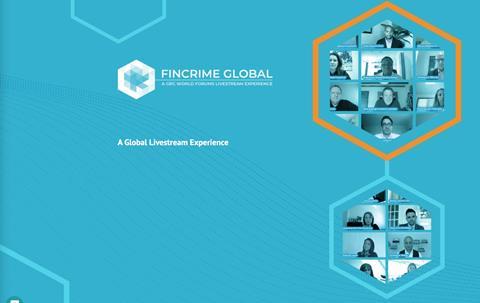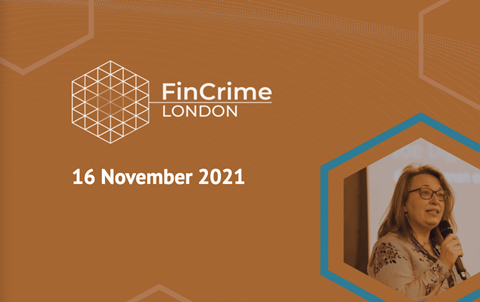Big brands and industry heads spoke at day one of FinCrime Global, allowing a global audience to get to the forefront of key themes such as kleptocracies within FinCrime, and the role of sanctions as a tool to tackle corruption.

The morning sessions got underway with a fascinating talk by Matt Hobbs, Head of FCC Strategy at Swift, into transformational times in payments and how SWIFT is supporting the community.
Matt underlined how false-positives being driven down represents a “real benefit” for the industry, stating “If data quality is high, we can carry out targeted screening”.
“Transaction manager will support the ISO format. You’ll have a transaction copy; the data will be largely immutable, which means you can have consistency of message from front to back, which will add huge value,” Mr Hobbs said.
“We’ve been looking at ISO20022 messaging and defining sanctions screening guiding principles: what can we do to put best practice in place? We’ve been working with the community and have published a paper with endorsement from the Wolfsberg group. We’ve had really positive feedback from the industry to date,” Mr Hobbs continued.
“RFI’s is a process we use today that’s causing huge amounts of pain. We’re looking to make standard templates, and we’ve worked with some of the banks to implement this. We’ve seen less back and forth on RFIs, allowing banks to release the transactions quicker,” he continued.
“There are huge strides being taken, but still a long way to go. What we do really matters,” Mr Hobbs finished.
In the morning’s second session, the changing landscape of sanctions came under the microscope, with our panel of experts considering the impact of ISO on message screening, testing for effectiveness and efficiency, and test automation as part of regulatory drives for deeper understanding of core controls.
Vijay Gopaladesikan, Head of Screening Product & List Management at Standard Chartered Bank, said:
“Fines in this space have been high since early 2000s, for AML and Sanctions it has exceeded 27 billion USD globally. The majority has been imposed by the US regulator.”
“It’s an industry-wide problem. The more effective you want to become, the less efficient your system will be, unless efforts are taken to further finetune the results.
“In terms of what typically an organisation should do - it is critical to have sound policy standards and clear risk appetite. We must decide what all the different message types that should be considered for screening, for instance,” Mr Gopaladesikan added.
“Depending on the market where the institution is present, we must determine the regulatory restrictions that apply. When it comes to watch lists, everyone typically goes to a third-party watch list provider, FIs must clearly choose the list of lists required to be used for each jurisdiction where they operate,” he continued.
Commenting on how best to improve efficiency in this sector, Pradheep Sampath, Executive Director, Group Legal and Compliance Platform Transformation Lead at DBS, said:
“To improve efficiency, risk management is key. This keeps evolving and it’s where some of the problems come. We must look at our own data sources to check they are still risk-relevant.
“You must also have to configure your screening depending on the jurisdiction. Especially on the transaction screening side, FIs can look at historical disposition information to recommend certain release actions to manage alert volumes.”
Related:

FinCrime London is an in-person forum taking place on the 16 November 2021 at the Riverbank Park Plaza, London. The forum will address the state of the nations fight against financial crime, tackling how the UK can become better, more efficient and effective at fighting financial crime.
The event will bring together leading subject matter experts for a one-day deep-dive into prominent issues facing those fighting financial crime, and provide the latest advice, guidance and insight.
The panel debate was followed by the day’s first fireside chat, bringing Robert Bateman into conversation with Laura Hutton, Chief Customer Officer at Quantexa.
A fireside Chat - how is the approach to fincrime strategy changing as organisations embrace technology
Delving into methodologies behind spotting financial threats, Laura said:
“Innovation is absolutely central, as criminals are taking advantage of modern technology. We have to be able to respond in the same way, and use weapons in our arsenal to fight this. If we are going to keep up with the criminals, we have to stay ahead and use technology to our advantage. This is not about ticking the box and doing the minimum, we need to step up and do everything we can.”
“People are incredibly talented, but we are asking them to sit through huge amounts of data, so it’s easier to miss things. We have to use technology to scan through this data in a way that makes sense and leverage our resources”
“Fincrime never goes away, and I think the pandemic has given criminals more space to act in.”
A highlight keynote session saw US journalist, Casey Michael explore kleptocratic money flows, where they come from and where they end up.
Establishing the landscape, Mr Michael said:
“When you think of money laundering via real estate, you might think of huge properties in NYC or LA, but that’s no longer the case. Now Kleptocrats are targeting small towns, factory towns across the US Midwest.
“We are being forced to broaden the aperture with regards to what international money laundering actually looks like,” he added.
In contrast to what many of us might think we understand about kleptocracy through TV shows, Mr Michael emphasised how the term actually means “the rule of thieves.”
“It’s a regime of those in power, using their positions to steal from local populations. It’s about the transnational, cross-border flow of illicit wealth.”
“Hundreds of billions, and in some estimates, trillions of dollars leaving countries, crossing borders, looking to be hidden, washed clean, and all too often, coming into the West, into countries like the US.”
Shining a light into the murky waters of money laundering, Mr Michael said:
“Private equity and hedge funds are not subject to any money laundering requirements whatsoever, and over the past two decades these industries have exploded in terms of assets. Lawyers in the west no longer provide services only in court. Now they provide most services under the sun that kleptocratic individuals come knocking for.
“Without anonymity, none of these illicit systems work - private equity, health funds, luxury goods providers, etc. All of these benefit from anonymous financial flows,” he added.
“It’s not just those who have technical positions of power. There is an oligarchic class that are effectively acting as members of the ruling class, even though they don’t have an official role,” he continued.
Don’t miss day two of FinCrime Global, where a fantastic line-up of sessions will unpack key themes such as:
- Regulation Technology (RegTech)
- the hidden risks of Tech-Fin
- Anti-Money Laundering Regimes
Join the live debate and make sure you don’t miss these sessions:
1. Assessing the RegTech Impact, streaming live at 13:30 BST.
2. Europe Toughens Up, streaming live at 14:15 BST.
3. Regulator Rhetoric, Tech Realities, streaming live at 15:30 BST.
Join us tomorrow, and be part of the one of the largest financial crime livestream event on the planet.
Missed a session? All the livestreams are available to watch on-demand now.












No comments yet